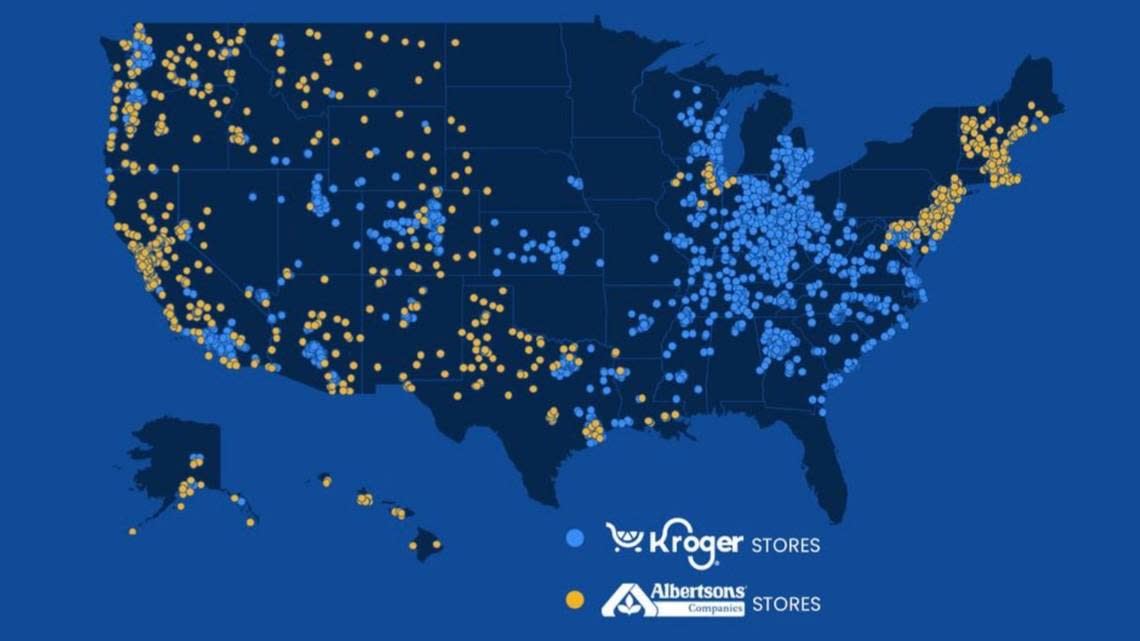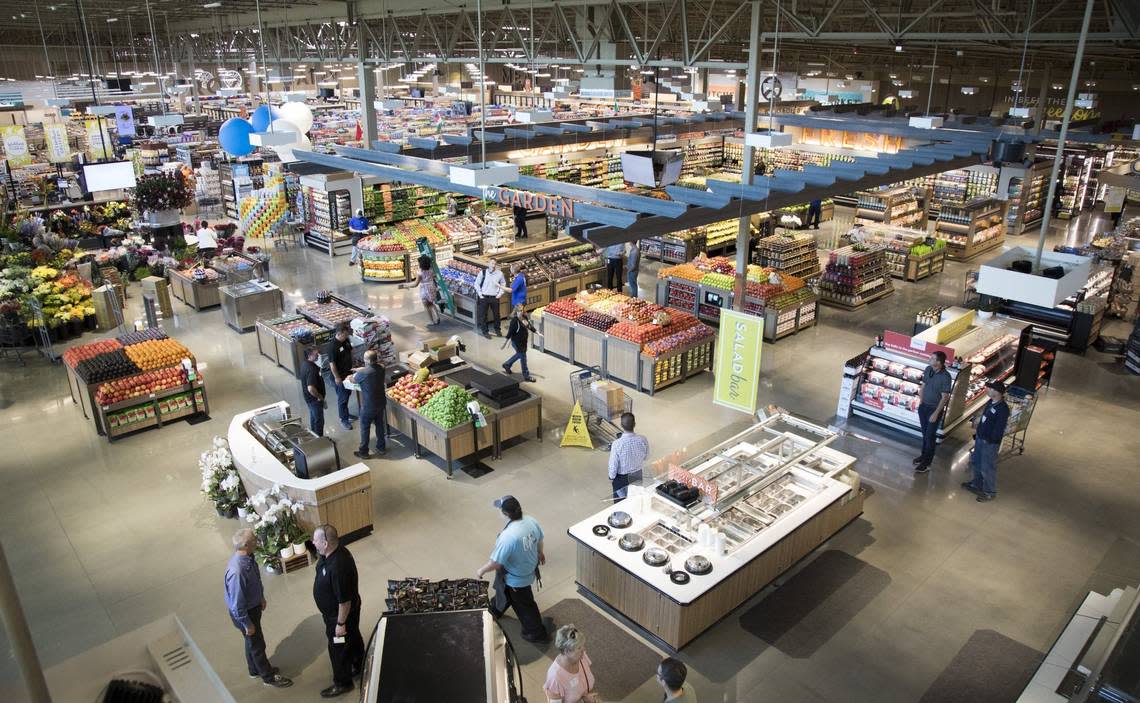Kroger makes deal to buy Albertsons. What that means for shoppers, workers, Boise
The grocery company Joe Albertson founded 83 years ago with a single supermarket in Boise may soon change hands again, this time via a merger with a bigger competitor.
Albertsons Companies Inc. and Kroger announced Friday that they have signed a pact to merge in a $24.6 billion deal, with Kroger buying all of Albertsons’ outstanding stock. The news came one day after unidentified sources disclosed to Bloomberg the possible combining of the country’s two biggest traditional grocery companies into a single giant.
If federal regulators approve, the deal may mean some job losses in accounting and other support or service jobs to avoid duplication, a national retail analyst told the Idaho Statesman. That could affect Albertsons’ corporate offices in Boise.
But it likely would preserve store workers’ jobs, leave stores’ names unchanged, lead to additional offerings of refrigerated and frozen foods, and give the combined company greater buying power, allowing stores to sell store brands and other goods for less than they would without the merger, said Burt P. Flickinger III, managing director of the Strategic Resource Group in New York City.
Even the combined company won’t command as much of the nation’s grocery market as Walmart does, Flickinger said by phone.
Because the merger will help the combined company compete, it “is the best possible outcome for Albertsons as well as Kroger and the consumers and workers and vendors in the communities where they operate,” said Flickinger, who said he has performed strategic and analytical work for both companies in the past but is not involved in the merger.
Unions representing some workers at both companies disagreed that the merger would help them or shoppers.
“The proposed merger of these two grocery giants is devastating for workers and consumers alike and must be stopped,” said Faye Guenther, president of the United Food and Commercial Worker Local 3000, which represents workers in parts of Washington, Oregon and North Idaho, in a statement on behalf of six of her union’s locals and a Teamsters local.
Both companies have heavily unionized workforces, although not in Idaho.

Idaho’s biggest company
Albertsons is Idaho’s largest company and a Boise icon, with $72 billion in yearly sales, 290,000 employees nationwide and more than 5,000 employees in Idaho. It has 2,273 retail food and drug stores under 24 banners in 34 states, including 39 under the Albertsons banner in its native state, 24 of those in Ada and Canyon counties.
Kroger’s Fred Meyer unit, based in Portland, competes directly with Albertsons in the Boise area. Fred Meyer employs more than 2,000 Idahoans and has seven stores in the Treasure Valley. Kroger, based in Cincinnati, employs 420,000 people nationwide.
That competition is a problem for the companies, as their merger must pass an antitrust review by regulators. Anticipating that, the companies said they would spin off between 100 and 375 stores into a new company to head off Federal Trade Commission concerns about excessive market concentration. Most are likely to be Albertsons Companies stores, Flickinger said.

Kroger and Albertsons did not immediately say what or where those stores would be, and Albertsons spokepersons did not immediately return calls and emails Friday seeking details.
The companies have significant overlap in California, Oregon, Washington state, Nevada, Wyoming, Colorado, Alaska and the Washington, D.C., area.
With Kroger in charge, Boise stands to lose one of its two most prominent headquarters for large, publicly traded corporations with national or international reach. The other is Micron Technology Inc., which employs about 40,000 people worldwide, including 6,000 in the Boise area.
Smaller public companies headquartered in Boise or its suburbs include Boise Cascade Co., Idacorp (the parent of Idaho Power), Lamb Weston, PetIQ and Clearwater Analytics.
Where store divestitures are likely
Flickinger said store divestitures are most likely in Southern California and the Seattle-Tacoma area, and perhaps in the Chicago, Portland and Denver areas. Divestitures are less likely in Boise, where Walmart, Costco and other grocery retailers have expanded aggressively, and the market concentration of Albertsons and Fred Meyer stores probably wouldn’t be enough to worry regulators, he said.
“In Boise and the Valley and statewide, the stores should be largely OK,” Flickinger said.
For Albertsons, the merger marks the completion of a review of strategic alternatives it announced in February and a culmination of a 16-year effort by Cerberus Capital Management to make and keep Albertsons profitable for its investors. Cerberus is a New York private equity firm that leads a group of investment companies that first acquired part of the former Albertsons Inc. in 2006 and still controls Albertsons today.
No shareholder vote needed
Cerberus and Albertsons don’t even need to hold a shareholder vote, because the holders of most Albertsons shares agreed to the mergers’ terms before Friday’s announcement. Albertsons began selling some stock to the public in June 2020, but Cerberus alone still holds roughly 30% of its shares, according to previous reporting by The Wall Street Journal.
“This transaction with Kroger provides substantial value to shareholders and exciting opportunities for associates to be part of a combined organization with the ability to better support the lives and health of millions of Americans,” said Chan Galbato, CEO of Cerberus operations and cochair of the Albertsons board, in the companies’ news release.
The combined company will be led by Rodney McMullen, the Kroger chairman and CEO.
“We believe this transaction will lead to faster and more profitable growth and generate greater returns for our shareholders,” McMullen said in the release.
Flickinger said Vivek Sankaran, whom Cerberus installed as Albertsons’ CEO in 2019, likely would stay on the merged company’s board. “Typically, the CEO of the acquired company stays on in an important leadership capacity,” he said.
Albertsons’ growth, decline, rebound
Today’s Albertsons Companies is a descendant of Albertsons Inc. After founding his first store at 16th and State streets in 1939 in Boise’s North End, Joe Albertson incorporated the company in 1945 and led it as chairman as the business kept expanding until his retirement in 1976. Albertson died in 1993, and his company later struggled as Walmart and other competitors rose.
Albertsons Inc. broke up in 2006 after years of losses. An investment consortium led by Cerberus bought some of its stores. Supervalu, a Minnesota company grocery wholesaler, bought the rest, including the Albertsons stores in Idaho.
That meant there were two Albertsons chains for several years. Both companies sold or closed some stores, but Supervalu still couldn’t make a go of it, so it sold its remaining stores to the Cerberus consortium in 2013, reuniting what remained of the two Albertsons chains.
The reunited company more than doubled in size in 2015 when it merged with the larger Safeway chain. It attempted to merge with Rite Aid in 2018, but that effort fell apart.
Albertsons has sharply reduced the debt it took on in the 2013 reunion and the 2015 Safeway acquisition. It has raised prices as inflation has soared this year, though a University of Idaho economist told the Statesman in July that its most recent earnings report showed no evidence of profiteering. Sankaran said then that customers were trading down to lower-cost brands.
The company has been opening new stores in the Boise area in the past few years. It used new stores on Broadway Avenue in Boise and in Meridian to experiment with more upscale and fresh foods and with additional experiences, such as bars where people can watch football games on TV. It has invested in e-commerce, home delivery and meal preparation.
Jobs, store investments, revenue, stock-sale price
According to the companies’ disclosures Friday:
Kroger would “invest” half a billion dollars in cost savings from synergies created by the merger into lower prices for customers. It would invest $1 billion “to continue raising associate wages and comprehensive benefits” for its workers and $1.3 billion into Albertsons Companies stores “to enhance customer experience.” The companies provided no details.
The combined company would employ more than 710,000 people and operate nearly 5,000 stores in 48 states and the District of Columbia.
Today they generate $210 billion a year in revenue and $3.3 billion in profit. Kroger generated $137.9 billion in fiscal 2021 sales and Albertsons $71.9 billion. Kroger’s net income totaled $1.65 billion; Albertsons’ $1.62 billion.
Kroger would buy all outstanding Albertsons shares for $34.10 in cash and other consideration, the price that values Albertsons at $24.6 billion. Albertsons would contribute $6.85 of the $34.10 in special cash dividends totaling $4 billion. The purchase price may be reduced by the per-share value of the new spin-off.
The price represents a 32.8% premium to the price of Albertsons stock at Tuesday’s market closing. (That was before Thursday’s leaked news of the possible deal, which pushed Albertsons’ stock price as high as $29.19 before closing at $27.94. The stock closed Friday at $26.21.)
Kroger would “invest” half a billion dollars in cost savings from synergies created by the merger into lower prices for customers. It would invest $1 billion “to continue raising associate wages and comprehensive benefits” for its workers and $1.3 billion into Albertsons Companies stores “to enhance customer experience.” The companies provided no details.
“Albertsons Cos. shareholders holding more than a majority of Albertsons Cos.’ common stock have either delivered a written consent or committed to delivering a written consent approving the transaction no later than October 18, 2022 and Albertsons Cos. shareholders holding more than a majority of Albertsons Cos.’ preferred stock have already approved the transaction. No further action by Albertsons Cos.’ shareholders will be needed or solicited in connection with the merger.”
The sale is expected to close in early 2024.
List of the 2 chains’ store banners
Albertsons says its 24 banners include Safeway, Vons, Jewel-Osco, Shaw’s, Acme, Tom Thumb, Randalls, United Supermarkets, Pavilions, Star Market, Haggen, Carrs, Kings Food Markets and Balducci’s Food Lovers Market.
Supermarkets: Kroger, Ralphs, Dillons, Smith’s, King Soopers, Fry’s, QFC, City Market, Owen’s, Jay C, Pay Less, Baker’s, Gerbes, Harris Teeter, Pick ‘n Save, Metro Market, Mariano’s.
Multi-department stores: Fred Meyer
Marketplace stores: Dillons Marketplace, Fry’s Marketplace, King Soopers Marketplace, Kroger Marketplace, Smith’s Marketplace
Price-impact warehouse stores: Food 4 Less, Foods Co.
America’s Top 10 grocery retailers
In 2021, according to a June post by FoodIndustry.com:
1. Walmart
2. Amazon
3. Costco
4. Kroger
5. Albertsons
6. Ahold Delhaize (Food Lion, Stop & Shop, Hannaford, Giant)
7. Publix (Southeast)
8. H-E-B (Texas)
9. Meijer (Midwest)
10. Target
